Is there WiFi in Cuba in 2023? Do they have Internet at all? If you are about to visit Cuba soon, you could be a little bewildered about what you have heard over the Internet in Cuba for tourists.
The truth is Internet access in Cuba is tricky. That’s why we’ve put together this helpful guide to teach you the ins and outs of the Internet in Cuba. Most importantly, we will reveal the tricks to access the Internet in Cuba for tourists.
Is there WiFi in Cuba? Does Cuba have Internet at all?
There is Internet and WiFi in Cuba. According to the World Bank, more than 70% of Cubans have Internet access. However, the service limited, restricted to minimal bandwidth, and expensive.
Cuba doesn’t have free Internet or WiFi; that applies to tourists and the general public. International visitors have an easier time connecting to the web than anyone else on the island because they can afford it and because the best connections are at resorts and hotels.
Cuba is a communist island, meaning the government controls the island’s resources, including the Internet. The Cuban Internet is run by a state-owned company called Empresa de Telecomunicaciones de Cuba (ETECSA). ETECSA is the sole provider of Internet, WiFi, and telephone services in Cuba.
How to access the Internet and WiFi in Cuba?
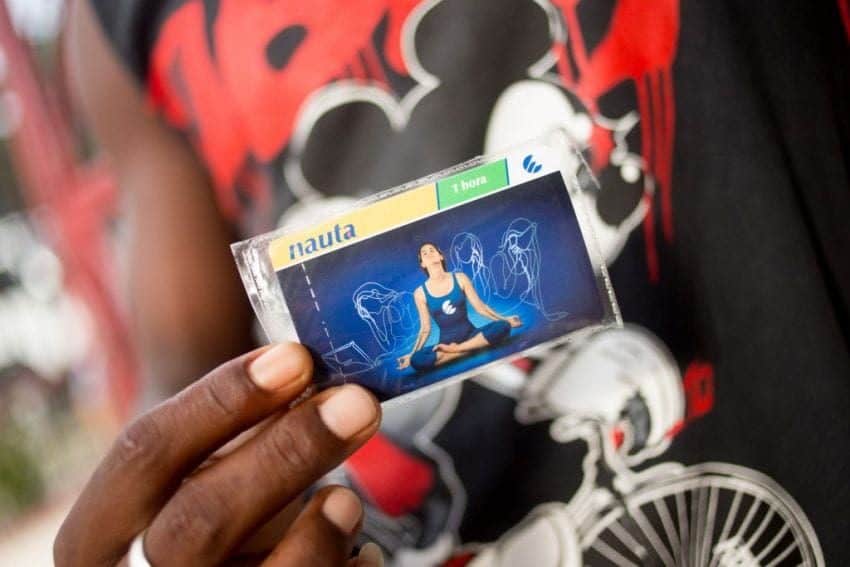
Brace yourself. Getting Internet access is one of the most frustrating facts about Cuba. Here are the options:
- Option 1 – Public Wi-Fi hotspots (requires the NAUTA card)
- Option 2 – Hotels and resorts (might require the NAUTA card)
- Option 3 – Rent Nauta Hogas from your host
- Option 4 – Airports (requires the NAUTA card)
- Option 5 – ETECSA Internet salons (requires the NAUTA card)
- Option 6 – Get the Cubacel Tur SIM Card
- Option 7 – Buy or rent SIM cards from international providers
- Option 8 – Rent a SIM card from your host
- Option 9 – International roaming
Before diving into each option to access the Internet in Cuba, let’s introduce you to the NAUTA card.
A NAUTA card lets you have WiFi and Internet access in Cuba at any of the following places:
- Public WiFi hotspots
- Major airports
- Hotels and resorts
- Desktop computers at ETECSA offices (these are called “Salas de Navegación”. See the full list here)
You can buy your NAUTA card at any of Cuba’s ETECSA offices, although some hotels and resorts sell them too. Be prepared to wait in a long line; recent visitors have reported waiting up to 2 hours at the ETECSA office in Havana.
So, how much does a NAUTA card cost? A 5-hour card costs 125 CUP, and a 1-hour card costs 25 CUP. Don’t forget: you’ll need your passport to buy the card!
Besides the ETECSA office and your hotel, there is a third option: the black market. If you buy a NAUTA card from a “private” seller, expect to pay an inflated rate. We don’t recommend this option!
Option 1 – Public WiFi hotspots (requires the NAUTA card)
To access the WiFi in Cuba, you must go to a designated spot to connect via WiFi. Web access is limited to those places instead of being widely available, like in North America or Europe. Most of these locations are in urban areas.
Therefore, if you are exploring the country’s countryside or backpacking the island, public WiFi hotspots may not always be available. Make sure to check the full list of hotspots.
Remember that, during the COVID-19 pandemic, there may be limited capacity at public hotspots. Please, read our guide to the current Cuba travel restrictions.
A word of caution: robberies are not unheard of at some of these locations. If you want to know more about travel safety in Cuba, check out our ultimate safety guide for Cuba.
How to sign in and log out of the WiFi in Cuba using NAUTA
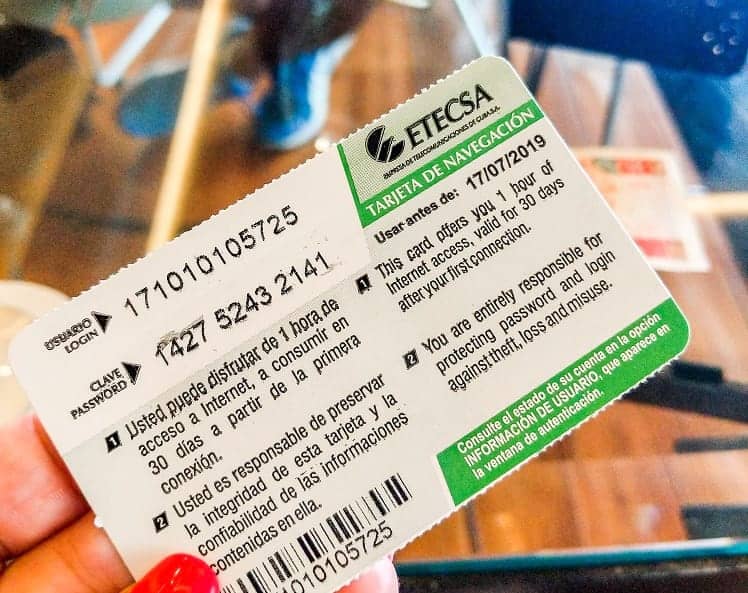
To get started, first select the network you want to connect to. This is where your NAUTA card comes in.
When you get your ETECSA NAUTA card, you’ll have to scratch it on the back to get a login code and password. Type in your login information when prompted, and then click accept. Voila! You should be connected in no time.
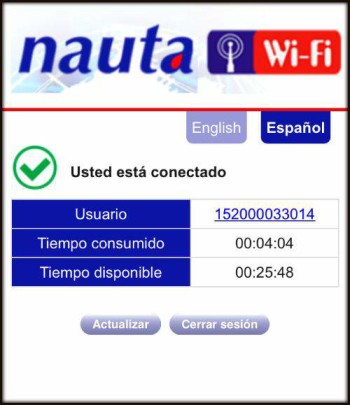
When you’re done browsing the web, remember to log off. You won’t accidentally waste any of your pre-paid WiFi minutes on idle time by logging off.
To log out, first type 1.1.1.1 into your browser’s search bar. When prompted, click “cerrar sesión” to log out. Wait for the confirmation notice to make sure the logout was successful.
Alternatively, you could also disconnect from the WiFi signal, and you’ll be automatically logged out. If the connection is bad and you’re struggling to log out, disconnecting from the network may be your only option.
Save your minutes: always remember to log out!
Option 2. Hotels and resorts (might require the NAUTA card)
Many of Cuba’s upscale hotels and resorts have free WiFi and cable Internet through desktop computers available for guests. This is a popular option to get Internet in Cuba for tourists. However, some small hotels may require you to buy the NAUTA card to connect.
Here is a list of popular hotels and resorts in Cuba with Internet access:
- La Habana: Presidente, Parque Central, Nacional.
- Cayo Largo: Playa Blanca.
- Varadero: Blau Marina, Blau Varadero, Iberostar Varadero, Iberostar Laguna Azul, Meliá Las Americas, Meliá Sol Palmeras, Memories, Ocean, Paradisus, Royalton Hicacos, Villa Cuba, Roc Barlovento.
- Trinidad: Iberostar Grand Hotel.
- Cayo Coco: Iberostar Mojito, Meliá Cayo Coco, Meliá, Jardines del Rey, Memories Flamenco, Memories Caribe, Playa Coco, Sol Cayo Coco, Tryp Cayo Coco, Colonial Hotel.
- Cayo Santa María: Husa, Meliá Buenavista, Royalton.
- Cayo Ensenachos: Iberostar Cayo Ensenachos.
- Cayo Guillermo: Iberostar Daiquiri.
- Guardalavaca: Blau Costa Verde, Memories Holguín, Paradisus Rio de Oro, Playa Costa Verde, Playa Pesquero.
You can check out the hotels in Cuba with Internet access at Skyscanner.
Option 3 – Rent your host’s Nauta Hogar account
Nauta Hogar offers Cuban homeowners WiFi access in their homes and public hotspots. They need to pay a monthly subscription, so it is not free and very limited.
For a price, your host may be willing to share their username and password with you. With access to a Nauta Hogar account, you can connect in your room, public hotspots, and airports!
Option 4 – Airports (requires the NAUTA card)
NAUTA cards are also available at Cuban airports, where you can connect to the WiFi in Cuba. You can get the NAUTA card at the Information booth (“Sala de Información”) at the standard price of 25 CUP/hour.
If you are flying to or from Havana Airport, read our guide to arriving at Havana Airport.
Option 5 – ETECSA Internet salons (requires the NAUTA card)
In all major cities in Cuba (and many small towns), ETECSA offers Internet salons for residents and visitors. At ETECSA Internet salons, known as “Salas de Navegación”, you can buy the NAUTA card and connect to the Internet using the desktop computers available.
This is a popular way for Cuban residents to access the Internet in Cuba, so be prepared for long lines!
You can find your nearest “Sala de Navegación” through ETECSA’s directory of Internet salons.
Like public hotspots, Internet salons may have limited capacity and reduced operating hours during the COVID-19 pandemic.
Option 6 – Get the Cubacel Tur SIM Card
The Cubacel Tur SIM Card is a temporary phone line for tourists offered by ETECSA. It lasts for 30 days. The basic package starts at 25 USD, including 2.5 GB of data, 20 minutes of international and national calls, and 20 SMS.
Before landing in Cuba, you can buy the Cubacel Tur Card through ETECSA’s authorized providers. Once you arrive, you should pick up the card at Terminal 3 of Havana Airport at the Cubatur booth. You can also pick up the card at any of ETECSA’s offices.
You don’t need to acquire the card in advance, though, since the card is available to buy at most of ETECSA’s offices.
There are a few other caveats about the Cubacel Tur Card that you need to keep in mind:
- It only lasts 30 days, and you cannot extend the duration.
- You can acquire it only at ETECSA’s authorized providers SuenaCuba, CubaCalls, and RecargasCuba.
- You must contact the providers directly if you want to cancel the service. ETECSA won’t cancel it!
- You may upgrade your package, but you will only receive more mobile data to up to 12 GB.
- You may need your phone to be unlocked.
- The line is not transferable, so forget about giving it as a gift to your new friend in Cuba.
Option 7 – Buy or rent SIM cards from international providers
If you like to plan (or don’t like the idea of dealing with ETECSA), a few websites out there will sell you Cuba SIM cards ahead of your trip.
OneSimCard and Cellomobile are two popular sites to buy or rent SIM cards for the Internet in Cuba for tourists.
OneSimCard prices: Incoming calls $0.65/minute; outgoing calls $1.25/minute; free incoming SMS text messages.
Cellomobile prices: Incoming calls $2.19/minute; outgoing calls $2.19/minute; free incoming SMS text messages; outgoing SMS messages $0.49/each.
Option 8 – Rent a SIM card from your host
Mobile phone users who want to access the web can rent a SIM card in Cuba. Some owners of “casas particulares” or Airbnbs in Cuba may have extra SIM cards you can rent during your trip.
This is an excellent option to connect since it does not require you to go to public hotspots.
Option 9 – International roaming
Certain major carriers offer roaming coverage in Cuba if you’d rather connect to the Internet using your cell phone instead of a desktop computer.
AT&T and T-Mobile are two popular carriers with roaming coverage in Cuba.
AT&T Cuba prices: $3.00/minute for calls; $0.50/text; $2.05/MB for data
T-Mobile Cuba prices: $2.00/minute for calls; $0.50/text; $2.00/MB for data
What can you do on the Internet in Cuba?
You will be able to open websites and access your email accounts. You can also search on the Web using any browser available online.
Downloading middle-size files and small multimedia archives is possible if speed allows. You could even book the best tours in Cuba through Tour Republic :).
Webcam chatting, posting to your social profiles, and consulting the weather are common uses too.
On the other hand, video streaming, online gaming, and even uploading middle-size files are challenging things to do.
How fast is the Internet in Cuba?
WiFi in Cuba is not fast, although it has significantly improved with the introduction of 4G. Speed levels vary, ranging from 150 Kbps at poor WiFi hotspots to 28 Mbps at upscale resorts.
However, remember that you may struggle to connect in some places, even today.
Are there restricted apps and online services in Cuba?
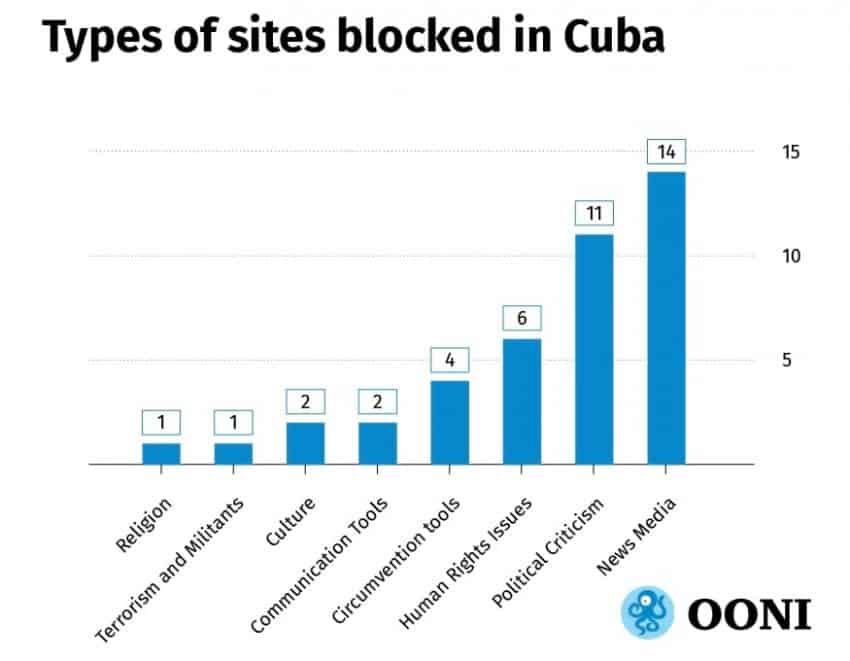
You’ll be able to access almost any app or online service in Cuba that you normally use in your home country.
There are a few exceptions; 41, to be exact. According to a recent report by the Open Observatory of Network Interference (OONI), that’s the number of websites currently blocked in Cuba. Most websites, such as political publications critical of the Cuban government, are those you wouldn’t normally visit as a tourist anyway.
The only major communications app blocked in Cuba is, interestingly, Skype. Instead, you can use other popular messaging tools like WhatsApp and Facebook messenger while in Cuba.
Some visitors like to use VPNs to access blocked websites and keep their private data while in Cuba. We recommend using NordVPN.
How safe is the Internet in Cuba?
Anytime you log into an unsecured network, you may be putting yourself at risk of being hacked or having your data stolen.
The Cuban Internet network is no exception. You can protect your personal data by subscribing to a VPN like NordVPN. A VPN is a software that encrypts your data so you can use an unsecured network without any risk to yourself.
Must-know tips for Internet usage in Cuba
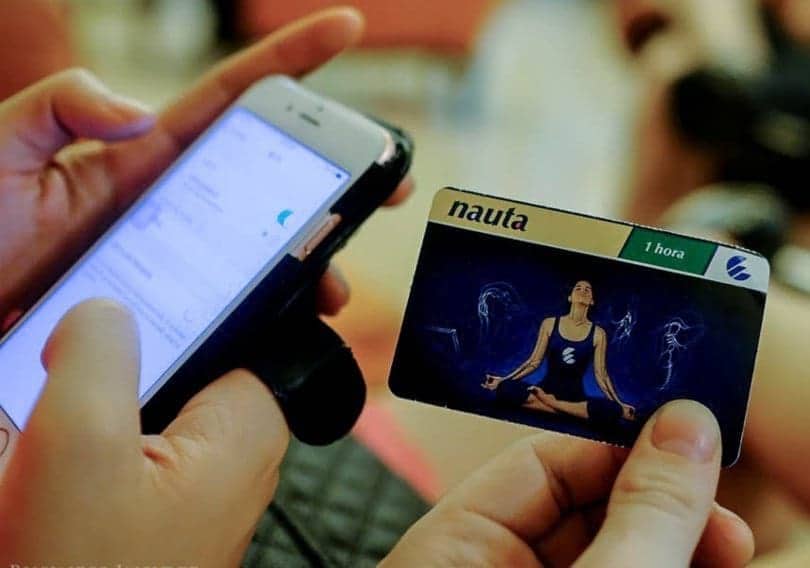
Don’t rely on it
Internet in Cuba is not available everywhere. Accessing where it is available can be expensive, and connections are often slow and unreliable. One traveler recently recounted that the Internet was down for four days in parts of Cienfuegos!
For these reasons, we recommend planning so your trip isn’t dependent on Internet access (i.e., pack paper maps, write down emergency numbers, etc.).
Do your research in advance
Assume your Internet connectivity will be spotty and sporadic while in Cuba. To avoid issues, you should front-load as much of your trip research as possible while at home.
Tour companies like Tour Republic can help you plan your full itinerary before you even set foot on the plane!
Read offline, and draft replies in a notes app
Since you won’t have a constant WiFi connection in Cuba, you’ll have to adapt by taking advantage of offline features.
For example, when reading and writing emails, Cubans will often read their emails offline, and draft replies in a notes app. Once you connect to a hotspot and log in via ETECSA, you can copy/paste your replies from the notes app into your email client.
Edit photos and videos using offline apps
Cuba is filled with beautiful scenery and landmarks you’ll undoubtedly want to take pictures and videos of.
Instead of relying on photo editing apps that require the Internet, use offline apps. Offline apps will allow you to edit, filter, and tweak to your heart’s desire wherever you are.
Once connected to a WiFi hotspot, upload your brag-worthy memories on your favorite social media site!
Don’t run out of battery
Being on vacation isn’t quite like being at home where you always have a power outlet or USB port within reach.
While in Cuba, we recommend carrying a portable charger with you. This one by INIU can charge two devices simultaneously and is compatible with both iPhone and Samsung phones. It can charge an iPhone to full power up to three times and a Samsung phone twice.
Avoid damage to your devices
If you plan to bring any plug-in electronics, we recommend using a power adapter.
An adapter like this one from SublimeWare is universal and is compatible with all US, UK, EU, and Chinese outlets.
Ask locals for help
Most of us are trained to immediately turn to Google if we have questions or need help. Not so in Cuba!
You’ll have to ask for help the old-fashioned way: approaching a friendly local. It helps to know Spanish, so pack a helpful Spanish-English phrasebook.
Don’t forget to disconnect!
When you use a NAUTA card, your card is loaded up with a certain number of prepaid minutes for online usage. Once you’re done with your web session, remember to log out from the WiFi network.
Helpful offline apps for traveling to Cuba
Here is a list of offline apps that may help you get around the Internet issues in Cuba!
- Google Maps: Did you know you can use this popular GPS tool offline? Simply download the offline version and use it to navigate Cuba minus WiFi or 4G. It can be super helpful for driving directions if renting a car in Cuba or to find the nearest Viazul bus station.
- Tripit: Keep your travel information organized with Tripit’s master itinerary. Simply forward your confirmation details to Tripit, and the app will keep you on track during your travels.
- Pocket: Lets you save articles, stories, and videos from any website or app so you can view them later.
- Zapya: A must-have app if you’re traveling in a group. Zapya allows wireless, cross-platform file sharing for everyone in your group. Share photos, music, videos, movies, and more with your buddies.
- A La Mesa: Yelp just for Cuba! Check out local “paladares” (private restaurants) and what people say about them.
- Kindle: Access magazines, novels, audiobooks, and games offline with Kindle. Perfect for a day at the beach.
- Audible: Audible lets you download a listen to audiobooks offline. Check out some of our book suggestions in the next section!
- Amazon Music: No trip is complete without a playlist. You can put together the perfect Cuba playlist with Amazon Music and listen to it during your trip.
- AccuWeather: Get an accurate forecast for Cuba’s weather. Especially handy if you plan to travel during the rainy season!
- American Red Cross First Aid: The app keeps you safe, no matter where you are. Red Cross will alert you if emergencies are nearby, including severe weather and hurricanes.
- Google Translate: Like Google Maps, Google Translate also has an offline version you can use. Download the offline tool so you can pop in a Spanish word you don’t understand (or an English word you’d like to translate into Spanish!), and you can have seamless conversations while in Cuba (or…get a pocket Spanish-English phrasebook).
Get in the mood: what to read and watch

Many visitors skip the Internet altogether and disconnect during their Cuba travels.
There are plenty of ways to get to know the island without the aid of the web. You can pack a few paperback books or even load up on movies and podcasts beforehand. See our suggestions for books and movies below to get you in the mood for your Cuba trip.
Download and read some good books about Cuba
Cuba has been a muse for some of the world’s best writers and artists for decades.
- The Old Man and the Sea by Ernest Hemingway: This classic takes place in Cuba and tells the story of a fisherman and his epic catch. Hemingway lived in Cuba for a time, and many of his works are inspired by his time on the island.
- Trading with the Enemy by Tom Miller: Veteran journalist Tom Miller traveled through Cuba for 8 months to experience everything the island had to offer–food, music, culture and traditions, and life’s difficulties under communism.
- The Other Side of Paradise by Julia Cooke: Journalist Julia Cooke explores the complexity of life in Cuba -how the natural beauty and electric atmosphere of the island coincide with the frustrations and challenges of communist governance.
- Dirty Havana Trilogy by Pedro Juan Gutierrez: Dirty Havana explores the sensual (and sometimes seedy) underbelly of nightlife in Cuba.
Download and watch some good films about Cuba
Oh man, do not miss any of these movies!
- Our Man in Havana: In the peak of the Cold War, a vacuum cleaner salesman is recruited to act as a British spy in Havana.
- Una Noche: Una Noche is a story about the struggle many young Cubans face: stay home to care for family in Cuba or strike out for Miami in pursuit of a different life.
- Fresa y Chocolate: Fresa y Chocolate (Strawberry and Chocolate) is a story that shows how two people from very different walks of life–one a loyal Communist, the other a gay political activist–can overcome their differences to form a friendship. Wonderful movie! It even received an Academy Award nom!
- Viva Cuba: This Cuban “Romeo and Juliet” story tells the tale of two young people living in Havana who fall in love amid their families’ long, bitter history.
- Cuba and the Cameraman: Cuba has undergone remarkable changes in the last century–from a dictatorship to a communist revolution and gradual liberalization in recent years. Cuba and the Cameraman document the stories of 3 Cuban families over 4 decades of Cuban history.
Or… chill out and disconnect
If all this sounds complicated, no worries; there’s another option: relax and disconnect. In fact, you won’t need the Internet at all if you only want to enjoy a quiet time at any of the spectacular beaches in Cuba.
I hope we answered your most burning question: is there WiFi in Cuba for you when you arrive? If you still have questions about the Internet in Cuba for tourists, take a look at ETECSA’s FAQs page (in Spanish :()
Do you plan to use WiFi in Cuba, or will you disconnect and live in the moment? Let us know your plan in the comments!
Essential Travel Logistics For Cuba
Cuban Tourist Card – If your Cuban Tourist Card (a.k.a Cuban Tourist Visa) isn’t bundled into your airline ticket or travel package, buy it only through EasyTouristCard.
Travel Health Insurance – Travel medical insurance is an entry requirement for Cuba, so you can’t skip it. Travelers can get travel health insurance for Cuba via Insubuy. Travel protection benefits such as trip interruption and cancellation, baggage delay insurance, etc., are not required.
Essential Items to Pack – Bring the essential travel necessities that you may not be able to get in Cuba:
- First aid kit
- Hand sanitizer
- Face masks
- Water bottle with filter
- Sunscreen
- Mosquito repellent
- Pin adapter (for Europeans)
- Travel guide
- Spanish-English phrasebook
- Suggested Reading: The Cubans: Ordinary Lives in Extraordinary Times
Read our complete packing list for Cuba.
Find Accommodations – Find hotels or casas particulares (private accommodations) on Skyscanner, which lists thousands of accommodations available in Cuba.
Book Your Flight – Book cheap flights to Cuba on Skyscanner, our favorite flight search engine to find deals on flights to Cuba.

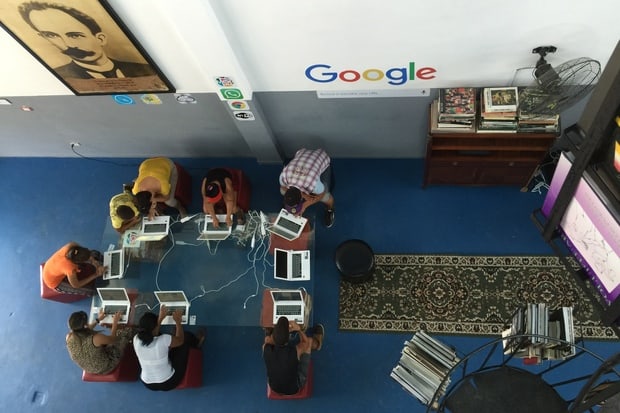

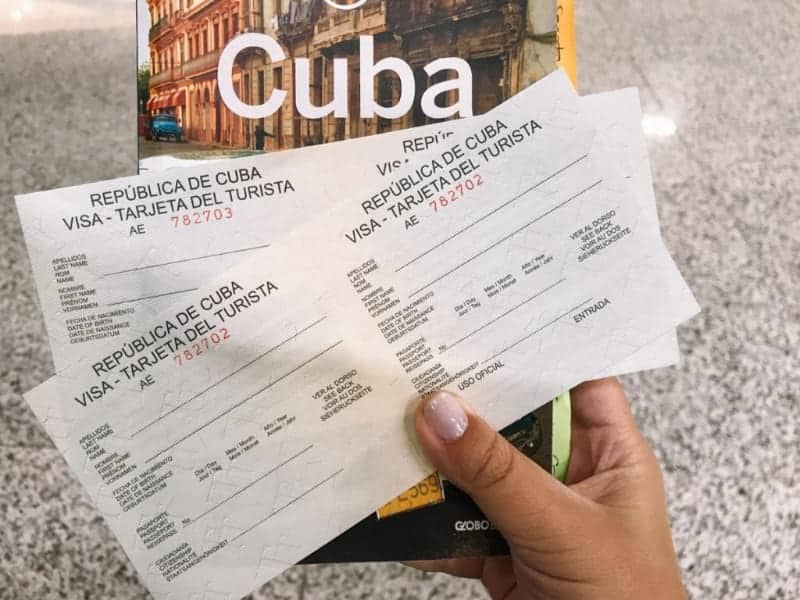
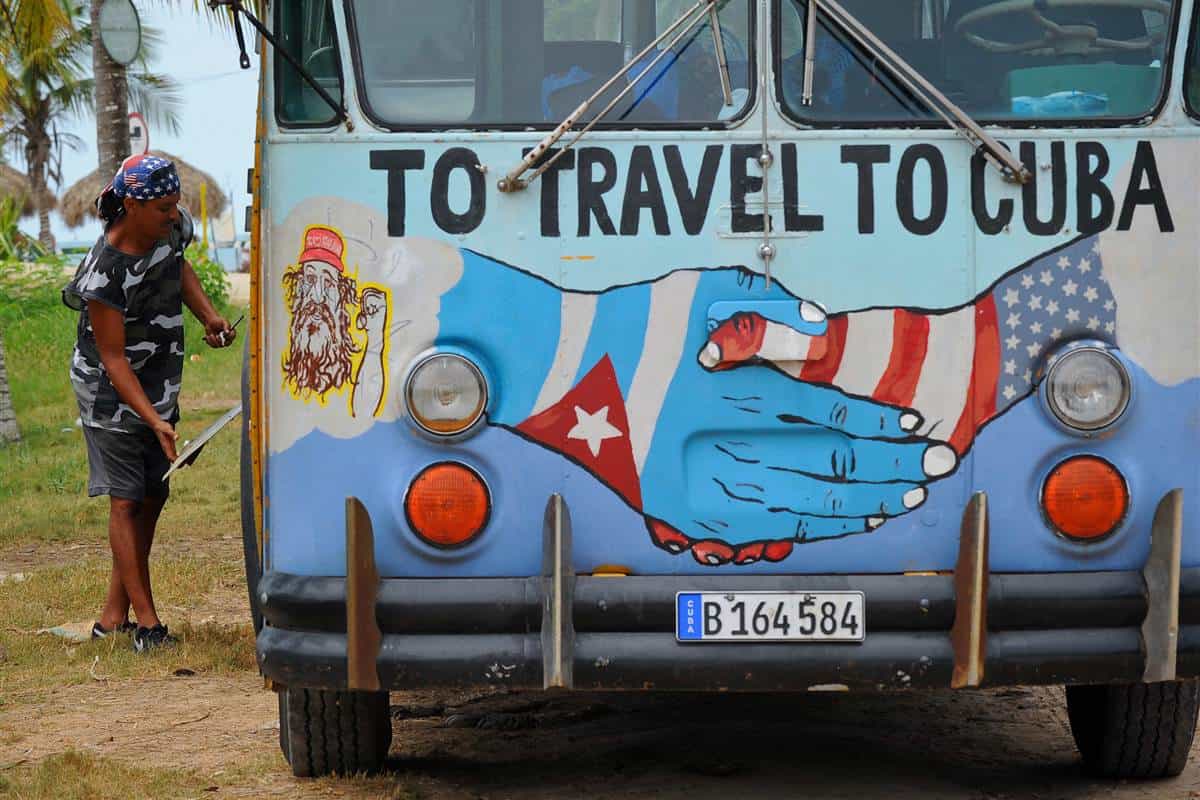
Hi! Great info, thanks! Weird though that your info about the SIM card is not accurate… on the https://www.etecsa.cu/ site, they say the allowance on the SIM card is 6 GB, not 2.5 as you mention in the article.
This post is a the bible! Thanks a lot!
Just a note, I’m clicking on the list of ETECSA but the page cannot be found (I get “pagina no encontrada”). Is there any problem with the link?